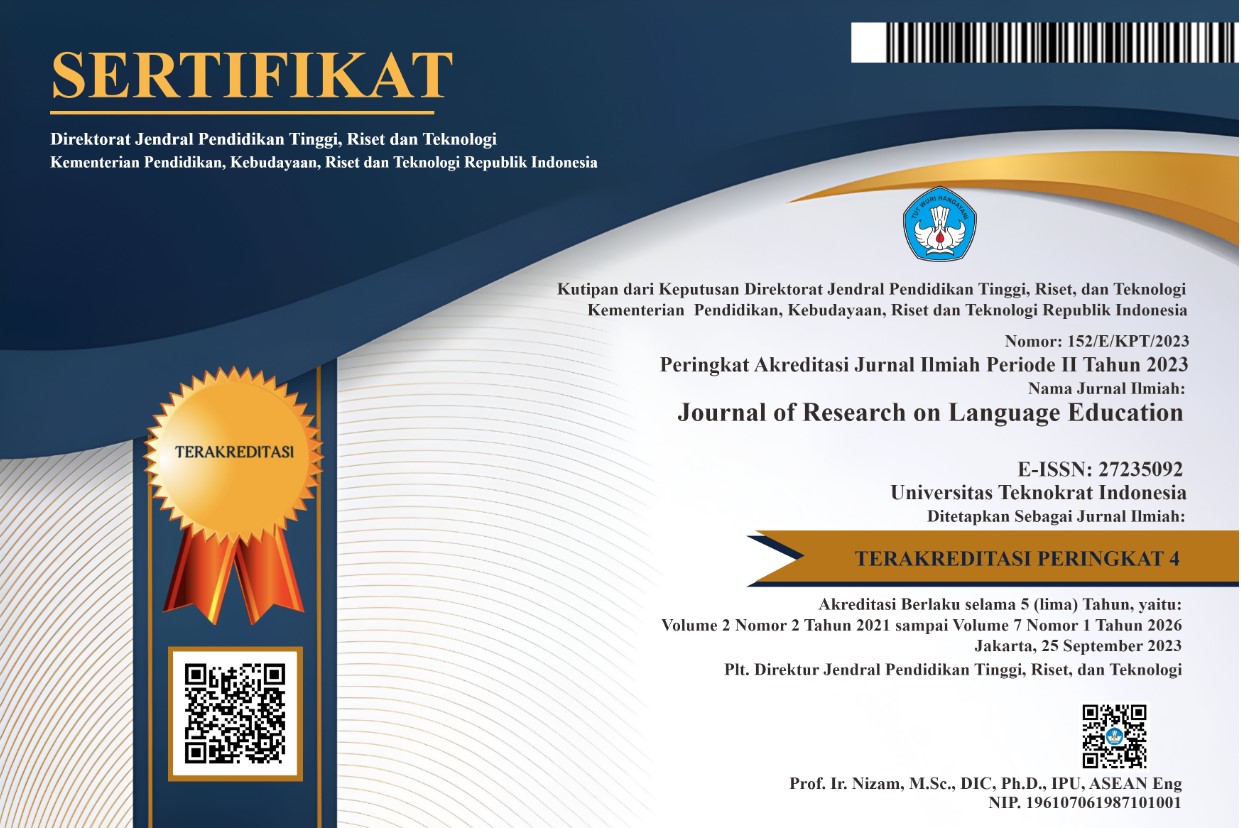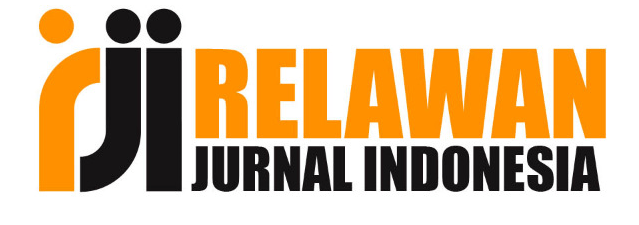THE PERCEPTION OF SEMESTER 4 ACCOUNTING STUDENTS ON LEARNING ENGLISH THROUGH WHATSAPP APPLICATION
Abstract
The pandemic due to the Covid 19 virus has brought all kinds of learning processes into a new era of online and mobile learning. One application that is widely used in online learning is WhatsApp. WhatsApp is not only easy to use because it can be operated via a mobile phone or operated via a personal computer or laptop, but also has features that support the English learning process. This research aimed to determine the perception of 4th semester students majoring in Accounting towards learning English through WhatsApp application at STIE Gentiaras, Bandar Lampung. This research was a quantitative descriptive research. The data was obtained using a questionnaire given to respondents online via Google Form. The population and sample of this research were 34 4th semester students majoring in Accounting. The data were analyzed using a Likert Scale and processed using SPSS 22. The results of the research were divided into 3 dimensions. However, 35.3% of students are doubt whether online learning is more comfortable than offline learning. From the results of the analysis, it can be concluded that the perception of 4th semester students majoring in Accounting at STIE Gentiaras Bandar Lampung towards learning English through the Whatsapp application is positive.
Keywords
Full Text:
PDFReferences
Adijaya, N., & Santosa, L. P. (2018). Persepsi Mahasiswa Dalam Pembelajaran Online. Wanastra, 10(2), 550.
Adila, Kharizatul., dan Yuzna Harisah. (2020). Persepsi Siswa kelas x MIPA SMA negeri 1 Bojong Terhadap Pembelajaran Online pada Pelajaran Matematika disajikan pada Seminar Nasional Pendidikan Matematika. Vol 1, No. 1, Januari 2020. Universitas Pekalongan, Indonesia.
Ainun, N. H., Nurweni, A., & Sholihah, L. (2020). The Students’ Perception of Voice Chatting through WhatsApp in Speaking Class disajikan pada The 2nd ICOPE 2020, October 17-18, 2020, Universitas Lampung, Indonesia.
Aminatun, D. & Oktaviani, L. (2019). Memrise: Promoting Students’ Autonomous Learning Skills through Language Learning Application. Metathesis: Journal of English Language, Literature, and Teaching, 3(2), 214-224. DOI: 10.31002/metathesis.v3i2.1982.
Ayu, M. (2020). Online Learning: Leading E-learning At Higher Education. The Journal of English Literacy Education, 7(1), 47-54.
Ayu, M. (2018). Interactive activities for effective learning in the overcrowded classroom. Linguists, 4(2), 1-6.
Behera, S. K. (2013). M-Learning: A New Learning Paradigm. International Journal on New Trends in Education and Their Implications. 4(2). 65-78.
Dewi, W. A. F. (2020). Dampak Covid-19 Terhadap Implementasi Pembelajaran Daring di Sekolah Dasar. Edukatif: Jurnal Ilmu Pendidikan, 2(1), 55-61.
Irwanto. (2002). Psikologi Umum. Jakarta: Prenhallindo.
Iskandar, R..(2020). Penggunaan Grup WhatsApp sebagai Media Pembelajaran terhadap Peserta Didik DTA At-Tawakal Kota Bandung. CommEdu (Community Education Journal), 3(20), 97-101.
Klopfer, E;K.Squire, and H. Jenkins. (2002). “Environmental Detectives: PDAs as a window into a virtual simulated world.” In Proceedings of IEEE International Workshop on Wireless and Mobile Tecnologies in Education. Vaxjo, Sweden: IEEE Computer Society, 95-98.
Kementerian Pendidikan dan Kebudayaan Republik Indonesia. (2020). Surat Edaran Menteri Pendidikan dan kebudayaan Republik Indonesia Nomor 35952/MPK.A/HK/2020. Jakarta: Direktorat Jenderal Pendidikan Dasar dan Menengah.
Lin, E., & C Lin. (2015). The Effect of Teacher-Student Interaction on Students Learning Achievement in Online Tutoring Environmen. International Journal of Technical Research and Application, 22, 19-22.
Mandasari, B., & Oktaviani, L. (2018). English language learning strategies: an exploratory study of management and engineering students. Premise Journal, 7(2), 61-79.
Muntazhima dkk. (2020). Respon Siswa Sekolah Menengah Terhadap Pembelajaran Matematika di Era COVID-19. Jurnal Pendidikan Matematika, 8 (3), 193-206.
Oktaviani, L., & Sari, F.M. (2020). Reducing Sophomore Students’Dilema in Creating an Appealing Teaching Medium Through Slidesgo Usage. Jurnal IKA PGSD (Ikatan Alumni PGSD) UNARS, 8(2), 342-349.
Oktaviani, L., Mandasari, B., & Maharani, R. A. (2020). Implementing Powtoon to Improve Students’ International Culture Understanding in English Class. Journal of Research on Language Education, 1(1), 19-25. DOI : 10.33365/jorle.v1i1.779
Prabowo, M. (2020). Persepsi Siswa kelas XII Terhadap Pembelajaran Daring Dalam Mata Pellajaran Pendidikan Jasmani dan Olahraga dan Kesehatan pada Masa Pandemi Covid-19 di SMAN 1 Bintan Timur Propinsi Kepulauan Riau Tahun 2020. Skripsi. Yogyakarta: Universitas Negeri Yogyakarta.
Pranajaya, P., & Wicaksono, H. (2018). Pemanfaatan Aplikasi WhatsApp (WA) di Kalangan Pelajar: Studi Kasus di MTS Al Muddatsiriyah dan MTS Jakarta Pusat Orbith. Majalah Ilmiah Pengembangan Rekayasa dan Sosial, 14 (I).
Pustikayasa, I. M. (2019). Grup WhatsApp Sebagai MediaPembelajaran.Widya Genitri: Jurnal Ilmiah Pendidikan, Agama Dan Kebudayaan Hindu, 10(2), 53-62.
Sharples, M., Taylor, J., & Vavoula, G. N. (2005). Towards a Theory of Mobile Learning. Proc. mLearn, 1, 1–9.
Slameto. (2010). Belajar dan Faktor-faktor yang Mempengaruhinya. Cetakan ke 5. Jakarta: PT Rineka Cipta.
Sudijono, A. (2009). Pengantar Statistik Pendidikan.Jakarta: PT Grafindo Persada.
Sugiyono. (2010). Metode Penelitian Pendidikan.Bandung: Alfabeta.
Sugiyono. (2015). Metode Penelitian Pendidikan (Pendekatan Kuantitatif, Kualitatif, dan R&D). Bandung: Alfabeta.
Suharsimi, Arikunto. (2006). Prosedur Penelitian Suatu Pendekatan Praktik. Jakarta: Rineka Cipta.
Suharsimi, Arikunto.( 2010). Dasar-dasar Evaluasi Pendidikan.Jakarta: Bumi Aksara.
Stockwell, Glenn.(2008). Investigating Learner Preparedness for and Usage Patternsof Mobile Learning. ReCall, 20(3):253-270. United Kingdom: European Association for Computer Assisted Language Learning.
Walgito, B. (2010). Pengantar Psikologi Umum.Yogyakarta: Andi Offset.
Yuliansyah, A. & Ayu, M. (2021). The Implementation of Project-Based Assignment in Online Learning during Covid-19. Journal of English Language Teaching and Learning, 2(1), 29-34.
DOI: https://doi.org/10.33365/jorle.v2i2.1163
Refbacks
- There are currently no refbacks.

This work is licensed under a Creative Commons Attribution-NonCommercial-ShareAlike 4.0 International License.

Articles published in Journal of Research on Language Education is licensed
under a Creative Commons Attribution-ShareAlike 4.0 International License.
English Education Study Program, Faculty of Arts and Education.
Universitas Teknokrat Indonesia
Zainal Abidin Pagaralam 9-11 Bandar Lampung, Indonesia
All rights reserved.








